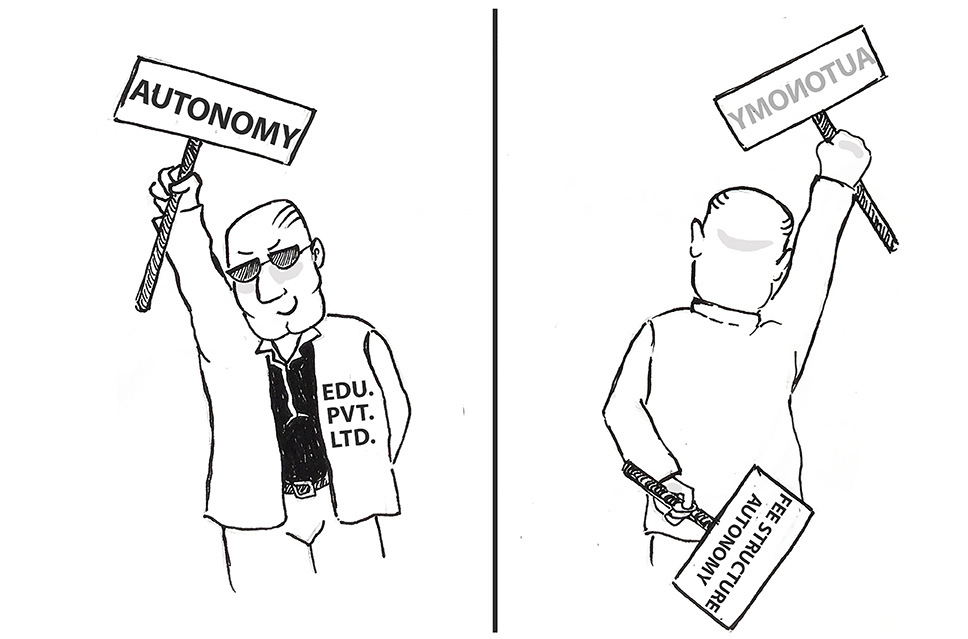NEP always perceived education’s role as the key to promote human and societal well-being. Again, it is highlighted in NEP that 21st century demands “good, thoughtful, well-rounded, and creative individuals” (NEP 2020). On the other hand, one of the basic ambitions of NEP is to empower a nation to find robust solutions to its own problems in terms of economic development through introduction of skill courses. The principles of the policy kept on uttering as follows: “The purpose of the education system is to develop good human beings capable of rational thought and action, possessing compassion and empathy, courage and resilience, scientific temper and creative imagination, with sound ethical moorings and values. It aims at producing engaged, productive, and contributing citizens for building an equitable, inclusive, and plural society as envisaged by our Constitution.” (NEP 2020)
But are we truly ready for this? This is not questioning the stakeholders who are responsible for implementing it. The question is open only to the beneficiaries of the policy. The first hurdle is, the beneficiaries of the policy conceived the policy as a mere change in formalities. This conception leads them to continue with the populistic obsolete vision of education. The policy itself never demands an intellectual’s eye to understand it, but rather a common man’s life to embrace it. A policy, such as the NEP, is being drafted not while dreaming for a grand and whimsical future. On the contrary, it is a natural process born out of the necessities that emerge in a society, or in a nation.
For instance, let us perform a brief reality check on few points to acquaint ourselves with the preparedness of the general public in the context of Manipur. NEP says, there must be academic flexibility, so that the learners have the ability to choose their learning trajectories and programmes, and thereby choose their own paths in life according to their talents and interests. We never know when this will ever happen in our society. In our context, whatever the case may be, programmes and courses are either set/choose by the parents/guardians, or by the populistic peer pressure. NEP says, there can be no hard separations between arts and sciences, between curricular and extra-curricular activities, between vocational and academic streams, etc. in order to eliminate harmful hierarchies among, and silos between different areas of learning. Here, are we prepared to cast away the habit of negotiating with our child, who is a talented guitarist, to promise him/her with the preferred guitar in exchange of good grades. NEP says to lay emphasis on conceptual understanding rather than rote learning and learning-for-exams. Will this ever calm the eagerness of hunting suggestions and probable questions for the upcoming exams? NEP highlighted creativity and critical thinking to encourage logical decision-making and innovation, but why are we seeing a series of pre-set questions and answers in the child’s notebooks? NEP focuses on regular formative assessment for learning rather than the summative assessment that encourages today’s ‘coaching culture’. We are speechless to make a comment on this. Latest cars are being booked/bought as a preparation for their ward’s exams. NEP believes full equity and inclusion as the cornerstone of all educational decisions to ensure that all students are able to thrive in the education system, but the child with protein shake and protein bars has been able to thrive better than those with superfine rice.
That being said, the author never intends to mock the existing scenario, or seek the benefit of doubt. The scenario could be a consequence of multiple factors that may be in or out of our hands. What lies ahead is to visualize the dynamics of emerging societies during the last five decades in the larger global context. What we need to understand, and what NEP truly intend to achieve, is the idea that evolution is not accumulation, development is not aggrandizement (of power, wealth, or reputation). Among various inferable factors, unfortunately, the later half of the 20th century in Manipur can be mark as an age of struggle to embark upon economic success and status. This historical phenomenon has successfully hypnotized the larger section of the society into a deep slumber. And this slumber needs an alarm louder than a policy to wake them up for the sake of development.












